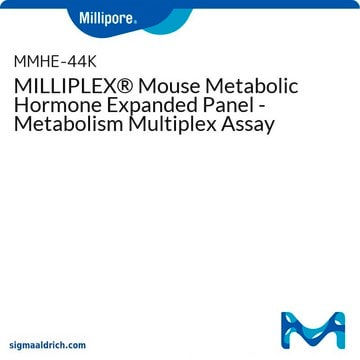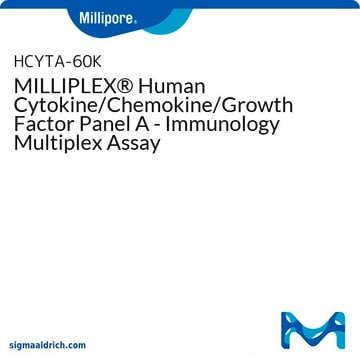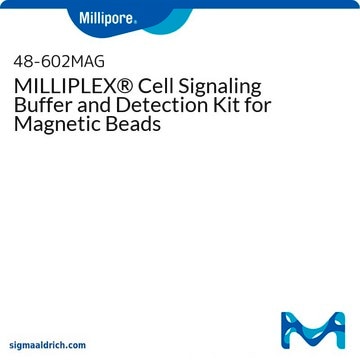HLPPMAG-57K
MILLIPLEX® Human Liver Protein Magnetic Bead Panel - Metabolism Multiplex Assay
The Human Liver Protein Panel, using the Luminex xMAP technology, enables the simultaneous analysis of 9 liver protein biomarkers in human serum, plasma and tissue/cell culture samples.
About This Item
Empfohlene Produkte
Qualitätsniveau
Speziesreaktivität
human
Hersteller/Markenname
Milliplex®
assay range
accuracy: 100.2%
(HGF)
accuracy: 93.7%
(ANGPTL3)
accuracy: 94.2%
(AFP)
accuracy: 96.6%
(FGF-23)
accuracy: 96.8%
(ANGPTL4)
accuracy: 98.8%
(FGF-21)
sensitivity: 0.004 ng/mL
(MinDC+2SD; FGF-21)
sensitivity: 0.014 ng/mL
(MinDC+2SD; FGF-23)
sensitivity: 0.018 ng/mL
(MinDC+2SD; HGF)
sensitivity: 0.054 ng/mL
(MinDC+2SD; FGF-19)
sensitivity: 0.144 ng/mL
(MinDC+2SD; AFP)
sensitivity: 0.218 ng/mL
(MinDC+2SD; FABP1)
sensitivity: 0.725 ng/mL
(MinDC+2SD; ANGPTL3)
sensitivity: 0.847 ng/mL
(MinDC+2SD; ANGPTL6)
sensitivity: 2.150 ng/mL
(MinDC+2SD; ANGPTL4)
standard curve range: 0.01-10 ng/mL
(FGF-21)
standard curve range: 0.04-30 ng/mL
(FGF-23)
standard curve range: 0.07-50 ng/mL
(HGF)
standard curve range: 0.14-100 ng/mL
(AFP)
standard curve range: 0.14-100 ng/mL
(FGF-19)
standard curve range: 0.27-200 ng/mL
(FABP1)
standard curve range: 0.69-500 ng/mL
(ANGPTL3)
standard curve range: 1.37-1000 ng/mL
(ANGPTL6/AGF)
standard curve range: 5.49-4000 ng/mL
(ANGPTL4)
inter-assay cv: <20%
intra-assay cv: <10%
(AFP)
inter-assay cv: <20%
intra-assay cv: <10%
(ANGPTL3)
inter-assay cv: <20%
intra-assay cv: <10%
(ANGPTL4)
inter-assay cv: <20%
intra-assay cv: <10%
(ANGPTL6/AGF)
inter-assay cv: <20%
intra-assay cv: <10%
(FABP1)
inter-assay cv: <20%
intra-assay cv: <10%
(FGF-19)
inter-assay cv: <20%
intra-assay cv: <10%
(FGF-21)
inter-assay cv: <20%
intra-assay cv: <10%
(FGF-23)
inter-assay cv: <20%
intra-assay cv: <10%
(HGF)
Methode(n)
multiplexing: suitable
Nachweisverfahren
fluorometric (Luminex xMAP)
Versandbedingung
wet ice
Allgemeine Beschreibung
MILLIPLEX® Human Liver Protein Panel is a 9-plex kit to be used for the simultaneous quantification of any or all of the following analytes in serum, plasma and tissue/cell culture samples: AFP, ANGPTL3, ANGPTL4, ANGPTL6/AGF, FABP1/L-FABP, FGF-19, FGF-21, FGF-23 and HGF.
NOTE: When assaying ANGPTL6/AGF it is recommended that serum samples be used.
This kit uses a 96-well format, contains a lyophilized standard cocktail, two internal assay quality controls and can measure up to 38 samples in duplicate.
The Luminex® xMAP® platform uses a magnetic bead immunoassay format for ideal speed and sensitivity to quantitate multiple analytes simultaneously, dramatically improving productivity while conserving valuable sample volume.
Panel Type: Metabolism
Spezifität
The ANGPTL6 standard had cross reactivity with the ANGPTL4 assay of less than 2%. For all other analytes, there was no or negligible cross-reactivity between the antibodies for an analyte and any of the other analytes in this panel.
Anwendung
- Analytes: α-Fetoprotein (AFP), ANGPTL3, ANGPTL4, ANGPTL6 (AGF), FABP1 (L-FABP), FGF-19, FGF-21, FGF-23, HGF
- Recommended Sample Type: Human serum, plasma, and cell/tissue culture supernatants or lysates
- NOTE: Serum samples are recommended when measuring ANGPTL6/AGF
- Recommended Sample Dilution: 12.5 μL per well of 1:2 diluted serum or plasma. Cell/tissue culture samples may be used undiluted or appropriately diluted in control medium.
- Assay Run Time: Overnight (16-18 hours) at 2-8°C is recommended for optimal sensitivity. 2 hours at room temperature (20-25° C) may also be used.
- Research Category: Metabolism
- Research Subcategory: Metabolic Disorders
Leistungsmerkmale und Vorteile
Verpackung
Lagerung und Haltbarkeit
Sonstige Hinweise
Rechtliche Hinweise
Haftungsausschluss
Signalwort
Danger
H-Sätze
Gefahreneinstufungen
Acute Tox. 3 Dermal - Acute Tox. 4 Inhalation - Acute Tox. 4 Oral - Aquatic Chronic 2 - Skin Sens. 1
Lagerklassenschlüssel
6.1C - Combustible acute toxic Cat.3 / toxic compounds or compounds which causing chronic effects
Analysenzertifikate (COA)
Suchen Sie nach Analysenzertifikate (COA), indem Sie die Lot-/Chargennummer des Produkts eingeben. Lot- und Chargennummern sind auf dem Produktetikett hinter den Wörtern ‘Lot’ oder ‘Batch’ (Lot oder Charge) zu finden.
Besitzen Sie dieses Produkt bereits?
In der Dokumentenbibliothek finden Sie die Dokumentation zu den Produkten, die Sie kürzlich erworben haben.
Unser Team von Wissenschaftlern verfügt über Erfahrung in allen Forschungsbereichen einschließlich Life Science, Materialwissenschaften, chemischer Synthese, Chromatographie, Analytik und vielen mehr..
Setzen Sie sich mit dem technischen Dienst in Verbindung.










